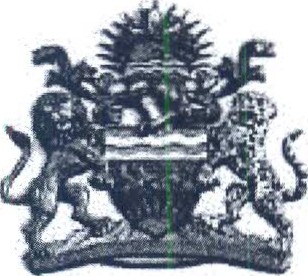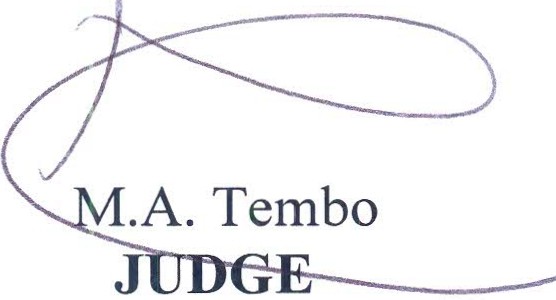

IN THE HIGH COURT OF MALAWI
PRINCIPAL REGISTRY
PERSONAL INJURY CAUSE NUMBER 26 OF 2014
BETWEEN:
DERICK MAFUNGA (A minor suing by his mother and next
Friend Chrissie Mafunga) PLAINTIFF
AND
K.J. CHOKOTHO
INGWE BUS COMPANY
PRIME INSURANCE COMPANY LIMITED
1st DEFENDANT
2nd DEFENDANT
3rd DEFENDANT
Coram: JUSTICE M.A. TEMBO,
Sudi, Counsel for the Plaintiff
Tandwe, Counsel for the 3rd Defendant Chanonga, Official Court Interpreter
ORDER
This is this court's order on the plaintiff’s application for an order of discovery of a specific document being a policy of insurance that the 3rd defendant allegedly issued to the 2nd defendant in this matter.
The facts of this matter leading to the plaintiff's application are essentially that the plaintiff sued the 3rd defendant as insurer of the 2nd defendant's driver who is alleged to have negligently driven the 2nd defendant's bus and caused injury to the plaintiff. The plaintiff relied on a police report that indicates that the date of the accident is actually just outside the period of insurance in this matter. The plaintiff had serious difficulties in obtaining the police report due to lack of cooperation by the Police. The police report itself had several material errors such as on the registration number of the bus herein. The plaintiff therefore seeks to have discovery of the policy of insurance in the foregoing circumstances.
The plaintiff relied on Order 24 rule 3 Rules of the Supreme Court which is in the following terms
(1) Subject to the provisions of this rule and of rules 4 and 8, the Court may order any party to a cause or matter (whether begun by writ, originating summons or otherwise) to make and serve on any other party a list of the documents which are or have been in his possession, custody or power relating to any matter in question in the cause or matter, and may at the same time or subsequently also order him to make and file an affidavit verifying such a list and to serve a copy thereof on the other party .
(2) Where a party who is required by rule 2 to make discovery of documents fails to comply with any provision of that rule, the Court, on the application of any party to whom the discovery was required to be made, may make an order against the first mentioned party under paragraph (1) of this rule or, as the case may be, may order him to make and file an affidavit verifying the list of documents he is required to make under rule 2, and to serve a copy thereof on the applicant.
(3) An order under this rule may be limited to such documents or classes of document only, or to such only of the matters in question in the cause or matter, as may be specified in the order.
The plaintiff then referred to the case of Attorney General and Others v Chakuamba and others [1999] MLR 17 where the Supreme Court of Appeal held that
(1) A party is entitled to discovery and inspection of matters, information or documents which are relevant to matters in question between the parties to an action. The parties ' pleadings have a direct bearing on what must be discovered.
(2) A party is entitled to discover documents or information which, might reasonably, contain information or material which may enable him to advance his own case or to damage that of his adversary.
(3) The court is not bound by the decisions of the Court of Appeal of England. However, such decisions are regarded by this Court with the greatest respect and are highly persuasive.
(4) The case of Compagnie Financiere et Commerciale du Pacifique v Peruvian Guano Co [1882] 11 QBD 55 needs to be laid to rest. The rule formulated in the case of Compagnie Financiered u Pacifique (supra) which allows discovery of a document which, on the face of it, is not connected with the issues raised in the plaintiff s statement of claim or the defendant's defence would enable a party to obtain an order for discovery and inspection for purposes of speculative investigation. This might allow discovery of documents which would be oppressive, unjust and costly on the part of the party from whom such discovery is requested. That is unacceptable.
(5) The decision in 0. Co v M. Co [1996] 2 Lloyds Rep 347, does not allow discovery of documents which are not shown by the applicant to offer a real probability of evidential materiality in the light of issues raised in the plaintiff s pleadings.
(6) An application for an order for discovery may be refused if it is shown that the matters, information or documents required to be discovered are not necessary for disposing fairly of the cause or matter.
(7) That the main factor to consider is whether a party applying for an order for discovery would suffer a litigious disadvantage by not seeing the requested document, or whether the party from whom discovery is sought would enjoy an unfair litigious advantage by refusing to disclose the document.
(8) That an examination of the entire Order 24 shows that there is no requirement, for the party applying for an order for discovery, to file an affidavit to show the relevancy and materiality of the requested documents. Order 24 rule 3(3) merely entitles a person required to produce documents for discovery to make and file an affidavit verifying his list of documents.
This Court notes that, as pointed out by the Supreme Court of Appeal, the mam factor to consider is whether a party applying for an order for discovery would suffer a litigious disadvantage by not seeing the requested document, or whether the party from whom discovery is sought would enjoy an unfair litigious advantage by refusing to disclose the document.
The 3rd defendant objects to the application for discovery arguing that the plaintiff has no basis for believing that the 3rd defendant had in its possession , custody and power the policy of insurance sought to be discovered by order of this Court. The 3rd defendant contends that this document was introduced by the plaintiff himself and he must prove the same. Particularly where the 3rd defendant denies being insurer in this matter.
The 3rd defendant also argues that it disclosed all the documents it had and that the plaintiff can only apply for discovery as he has done had the 3rd defendant failed to give discovery.
The plaintiff counter argued that the 3rd defendant relies on the police report to show that the accident herein happened a day after the insurance cover lapsed. And that therefore the insurance policy must exist as per the police report.
This Court has noted that there is a continuing duty to give discovery until conclusion of trial as indicated in Note 24/2117 to Order 24 rule 1 Rules of the Supreme Court which states that
Although one reading of 0.24, r.1 may suggest that discovery need be given only of documents which have come into a party's possession before the date of his list of documents, this is not the limit of a party's obligation to give discovery imposed by the rule. The obligation is general, and requires the disclosure of all relevant documents whenever they may come into a party's possession. This requirement is supported by the linked principle that a party must not seek to take his opponent by surprise (cf. 0.18, rr.8 and 9), and that he must not, by withholding relevant documents, mislead his opponent or the Court into believing that the statement in his list that he has given full discovery continues to be true (Mitchell v. Darley Main Colliery Co. (1884) Cab. & Ell. 215). An obvious example is where a plaintiff, who is claiming damages for prospective loss of earnings, obtains new lucrative employment during the course of the action; this fact must be communicated to the defendant and further discovery must be made (or, at all events, offered). In default, the plaintiff may be ordered to pay any costs occasioned by the failure to give discovery promptly. See too Vernon v. Bosley (No. 2) [1997] 3 W.L.R. 683; [1997] 1 All E.R. 614 in which the Court of Appeal reaffirmed that a party to civil litigation was under a continuing obligation under RSC, 0.24, r. l until the conclusion of the proceedings to disclose all relevant documents whenever they came into his possession, unless they were clearly privileged from disclosure, notwithstanding that discovery by list or affidavit had
already been made. Where, therefore, a document was disclosed to a party after he had closed his case, or the evidence as a whole was concluded, he should apply to the court to reopen the case in the light of the disclosure if the document was of real significance and there was otherwise a risk of injustice.
In road collision cases such as the instant one discovery is not automatic but by order of the Court. See Order 24 rule 2 (2) Rules of the Supreme Court. And one of the objects of Order 24 rule 3 Rules of Supreme Court is to allow application for discovery in running down cases such as the instant one where some issue calls for discovery. See Note 24/3/2 to Order 24 rule 3 Rules of Supreme Court. Such an application, though normally made at the hearing of a summons for directions, can be made at any time because the duty to give discovery also runs through the course of the trial.
This Court however notes that the pleadings in this matter clearly show that the 3rd defendant completely denies insuring the 2nd defendant. As submitted by the 3rd defendant, it is for the plaintiff to prove that indeed the 2nd defendant was insured by the 3rd defendant. The police report herein is not admissible without calling the author of the same to testify as to the truth of its contents. See Bauleni and others v Siku Transport and another personal injury cause number 299 of 2010 (High Court) (unreported). The 3rd defendant is therefore right in submitting that there is no basis for supposing that the 3rd defendant may have in its possession, custody or control the insurance policy document as alleged in the police report because the police report itself, which would have supported such a supposition at this point, is inadmissible as to the truth of its contents.
As it is, the order for discovery cannot be made since the 3rd defendant completely denies insuring the 2nd defendant and there is no evidence on the record to show the possibility of the contrary.
Each party shall bear its own costs.
Made in open court at Blantyre this 3rd August 2016.
